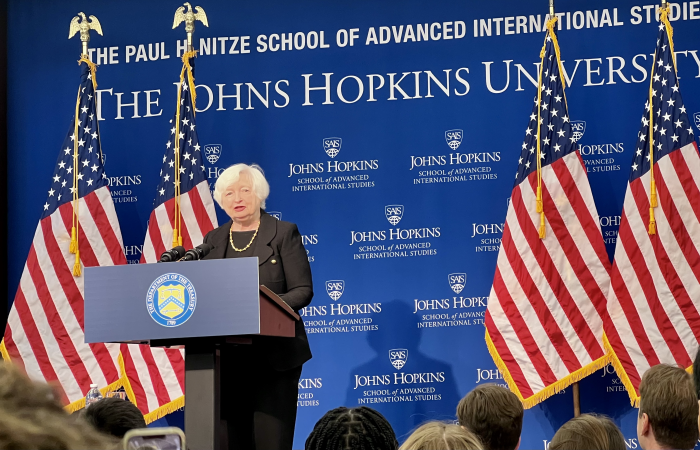Amidst strained diplomatic ties and economic challenges, U.S. Treasury Secretary Janet L. Yellen’s recent remarks at Johns Hopkins School of Advanced International Studies may signal a new direction for the U.S.-China economic relationship. By emphasizing the importance of a constructive and fair partnership, Yellen’s positive voice offers a glimmer of hope for the U.S.-China relations. By focusing on open dialogue, collaboration, and addressing global challenges, the Treasury Secretary’s upcoming visit to China may offer a channel, though with a low ceiling, to balance the surging bilateral competition and collaboration.
While the U.S. will keep on prioritizing its own values and national security, the Treasury Secretary calls both countries to maintain open dialogue to address challenging issues, and collaborate when possible for mutual and global benefit. Secretary Yellen outlined three primary objectives for the U.S. economic approach to China. First, in the eyes of securing national security interests and protecting human rights, the US will communicate its concerns about China’s behavior and defend vital interests without “gain[ing] competitive economic advantage.” Second, the US will collaborate with allies to address China’s unfair economic practices while investing domestically and promoting “an open, fair, and rules-based global economic order,” since the U.S. and the world will benefit from a ‘behaving’ China and a healthy U.S.-China economic relationship that encourages growth and innovation. Finally, to benefit the national interest of both parties, both should seek continuous cooperation on urgent global challenges. The U.S. urges China to fulfill its promise to work together on these issues out of joint responsibility and obligation to the world.
Although Yellen’s speech contains many criticisms of China, it generally repeats the criticisms made by her White House colleagues such as Secretary of State Antony Blinken and Trade Representative Katherine Tai. Notably, her remarks offer few criticisms that are unique to the Treasury’s perspective. This pattern of repetition and broad-strokes criticism may be Yellen’s attempt to ease internal disagreements within the Biden administration, which has faced considerable difficulty formulating and advancing a cohesive China policy.
The Biden administration’s struggle to carry out effective China policies is not a secret. The rhetoric-heavy, action-light approach of Yellen’s speech is a microcosm of the Biden administration’s handling of China affairs over the past two years. Struggling with domestic political pressure, the Biden administration has limited political capital on China issues and is unlikely to form an effective China policy in the short term. They can only adopt a more selective “a la carte” approach to produce tangible outcomes that provide short-term benefits. Until 2024, the Biden administration seems unable to make any substantive contributions to ameliorate the China-US relations.
Yellen’s talk on human rights and unfair trade competition in China seems to be calibrated to align with the stance of the newly ascendant Republican Congress on Chinese matters. This may be because Yellen’s current most pressing issue is the US government’s debt ceiling. Confronted with an intransigent Republican opposition that demands government spending cuts, the Biden administration is at risk of facing the first-ever situation where the US government defaults on its financial obligations. Therefore, although some of Yellen’s remarks may cause dissatisfaction in China, they may not need to be taken too seriously. While signaling Chinese leadership, this speech is also addressing to the domestic audiences. Whether Yellen can genuinely contribute to bilateral relations still depends on the outcome of her possible future visit to China.
Given the complex dynamics and competing interests at play, it is clear that Yellen’s speech navigates a delicate path between addressing domestic concerns and fostering dialogue with China. Her words serve as a reflection of the intricate dance of diplomacy the U.S. must perform to balance its own internal politics with the crucial task of managing relations with an increasingly powerful China. The principles she outlined in the speech implied the boundaries and windows of the U.S.’s side for the upcoming negotiations and mutual understanding. Since the meeting between Presidents Biden and Xi, both countries have agreed to improve communication on macroeconomics and cooperate on issues like climate change and debt distress. Particularly in the circumstance of Blinken and Tai actively rejecting communication with China, or of China losing confidence in them, Yellen’s anticipated visit to China may not only balance the negative impact of Secretary of Commerce Gina M. Raimondo’s planned visit, but also send a constructive voice at this critical moment. Though it may not guarantee a significant improvement, the visit provides a window to nurture the bilateral relationship.
One focal point for the bilateral negotiation would be the solutions to the long-term dilemma faced by the United States. As the speech acknowledges, “[a] growing China … can mean rising demand for U.S. products and services and more dynamic U.S. industries.” While the U.S. domestic economic development relies on competition with China, the current economic development predicament, especially the macroeconomic problems represented by the weakening US dollar, dropping US dollar credit, and the growing concern over debt ceiling and defaulting, requires immediate cooperation with China to stabilize market confidence and to consolidate the US dollar-centered global economic and financial system.
Besides, as global financial institutions make progress on system reform and debt restructuring, Yellen’s speech released a signal of U.S. willingness to sit down for negotiation, which underscores the potential for collaboration between the two economic giants in addressing these critical issues. Her remarks come in the context of global finance officials, the International Monetary Fund (IMF), the World Bank, and the private sector addressing stalled debt restructuring efforts in a Washington meeting two weeks ago. She pointed out that China’s status as the world’s largest official bilateral creditor imposes on it the same “inescapable set of responsibilities” as other official bilateral creditors when it comes to managing unpayable debts. Although China has recently made financing reassurance for Sri Lanka, the Secretary has urged China to take on more responsibility in providing debt treatments for struggling countries, such as Zambia and Ghana.
Although there is no normalized mechanism yet for countries to address the global debt hangover, potential establishments may create a new communication channel and collaboration point for the U.S. and China in developing regions with high potentials, more specifically, large markets and rich energy. As the issue has been raised in various high-profile events, stakeholders shall already have a pragmatic view on the difficulties of taking the first step. To better activate the below-radar private sectors, China has been working closely with the World Bank on the participation of blended finance and concessional finance as potential solutions to debt restructuring. In this sense, Yellen’s highlighting the need for cooperation between the United States and China in assisting emerging markets and developing countries in debt distress can encourage substantial results.
Despite the challenges, Yellen’s pragmatic standpoint, moderate approach, and constructive voice provide a counterbalance to the negative impacts of recent diplomatic interactions and set the stage for potential improvement of bilateral relations in the upcoming negotiations.




